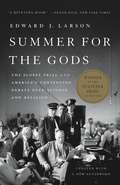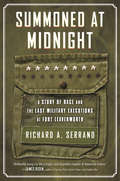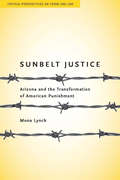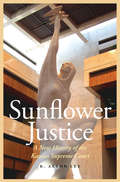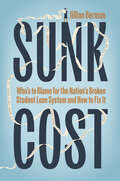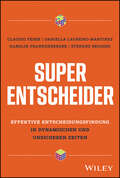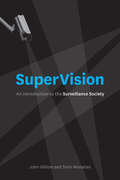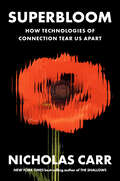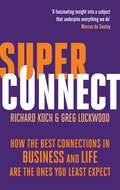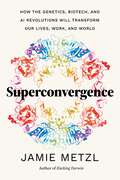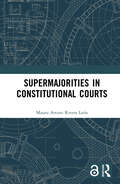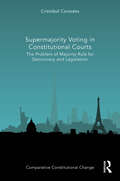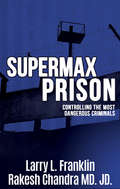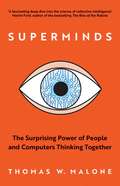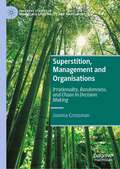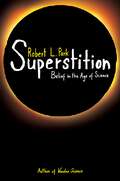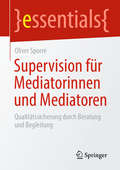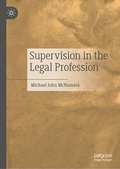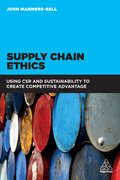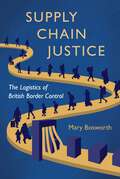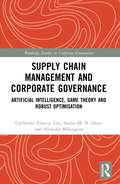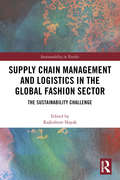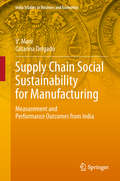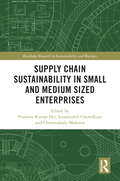- Table View
- List View
Summer for the Gods: The Scopes Trial and America's Continuing Debate Over Science and Religion
by Edward J. LarsonThe Pulitzer Prize-winning history of the Scopes Trial and the battle over evolution and creation in America's schools.In the summer of 1925, the sleepy hamlet of Dayton, Tennessee, became the setting for one of the twentieth century's most contentious courtroom dramas, pitting William Jennings Bryan and the anti-Darwinists against a teacher named John Scopes, represented by Clarence Darrow and the ACLU, in a famous debate over science, religion, and their place in public education. That trial marked the start of a battle that continues to this day in cities and states throughout the country. Edward Larson's classic Summer for the Gods -- winner of the Pulitzer Prize in History -- is the single most authoritative account of this pivotal event. An afterword assesses the state of the battle between creationism and evolution, and points the way to how it might potentially be resolved.
Summer for the Gods: The Scopes Trial and America's Continuing Debate Over Science and Religion
by Edward LarsonIn the summer of 1925, the sleepy hamlet of Dayton, Tennessee, became the setting for one of the 20th century's most contentious dramas: the Scopes trial that pit William Jennings Bryan and the anti-Darwinists against a teacher named John Scopes into a famous debate over science, religion, and their place in public education That trial marked the start of a battle that continues to this day-in Dover, Pennsylvania, Kansas, Cobb County, Georgia, and many other cities and states throughout the country. Edward Larson's classic, Summer for the Gods, is the single most authoritative account of a pivotal event whose combatants remain at odds in school districts and courtrooms. For this edition, Larson has added a new preface that assesses the state of the battle between creationism and evolution, and points the way to how it might potentially be resolved.<P><P> Pulitzer Prize Winner
Summoned at Midnight: A Story of Race and the Last Military Executions at Fort Leavenworth
by Richard A. SerranoA lost history of racial discrimination in America's capital punishment system revealed by seventeen lives lived in the Fort Leavenworth military prisonBetween 1955 and 1961, seventeen condemned soldiers--eight white, nine black--lived together on death row at Fort Leavenworth military prison. All eight of the white soldiers were eventually paroled and returned to their families, spared by high-ranking army officers, the military courts, the White House staff or President Eisenhower himself, sympathetic doctors, and attorneys highly trained in capital litigation. One white master sergeant was serving time for drowning the eight-year-old daughter of an army colonel in Japan. But when the girl's parents forgave him, it sparked a national effort that opened the prison doors and set him free.During the same six-year period, almost every black soldier was hung, lacking the benefits of political connections, expert lawyers, and public support of their white counterparts. By 1960, only the youngest black inmate, John Bennett remained on death row. His battle for clemency was fought over the backdrop of a strengthening civil rights movement, and between two vastly different presidential administrations. With each year came a new legal twist, his freedom and his life hanging in the balance between evolving ideas and realities of race in America.Now, drawing on interviews, transcripts, and rarely-published archival material, Pulitzer Prize-winning journalist Richard Serrano uncovers the lost history of these unforgettable characters, the scandalous legal maneuvering that reached the doors of the White House, and the intimate history of the racism that pervaded the armed forces long after its integration.
Sunbelt Justice
by Mona LynchIn the early 1970s there were fewer than 500,000 prisoners incarcerated in Federal and state prisons in the US: a rate of approximately 100 imprisoned persons per 100,000 of population. Today more than 1. 5 million people are imprisoned in the US at a rate of more than 400 per 100,000 people in the general population. Where the penal system thirty years ago was focused on rehabilitation, the emphasis now is on punishment of criminals and keeping society safe. This book looks at Arizona as a microcosm of the US as a whole in tracking trends and changes that have taken place in criminal justice over time. Annotation c2010 Book News, Inc. , Portland, OR (booknews. com)
Sunflower Justice: A New History of the Kansas Supreme Court (Law in the American West)
by R. Alton LeeUntil recently, American legal historiography focused almost solely on national government. Although much of Kansas law reflects U.S. law, the state court’s arbitrary powers over labor-management conflicts, yellow dog contracts, civil rights, gender issues, and domestic relations set precedents that reverberated around the country. Sunflower Justice is a pioneering work that presents the history of a state through the use of its supreme court decisions as evidence. R. Alton Lee traces Kansas’s legal history through 150 years of records, shedding light on the state’s political, economic, and social history in this groundbreaking overview of Kansas legal cases and judicial biographies. Beginning with the territorial justices and continuing through the late twentieth century, R. Alton Lee covers the dispossession of Native Americans’ land, the growth and impact of labor unions, antimonopoly cases against railroad and mining companies, a nine-year state ban on the movie Birth of a Nation, and implications and effects of desegregation, as well as the shooting of Dr. George Tiller for performing legal abortions. Because judicial decisions are not made in a vacuum, Lee presents each of the justices in the context of the era and their personal experiences before examining how their decisions shaped Kansas political, economic, social, and legal history.
Sunk Cost: Who’s to Blame for the Nation’s Broken Student Loan System and How to Fix It
by Jillian BermanExposes the forgotten origins of the student loan system, how politicians have attempted to fix it, and the life-altering damage borrowers face. Student-loan horror stories are a dime a dozen. But students today are faced with a seemingly insurmountable paradox: Research consistently shows that the clearest viable option to financial stability is a college degree. But if and when Americans decide to pursue diplomas, student loan payments quickly follow, and even after securing full-time employment, many borrowers struggle to make ends meet for years. In Sunk Cost, journalist Jillian Berman explores how the nation’s student loan program went from a well-intentioned initiative aimed at helping low- and middle-income students afford college to one that traps borrowers in long-term debt. Berman interviewed dozens of borrowers and policymakers and dug into the archives to unearth the true causes of the student loan problem. A couple of generations ago, policy makers generously subsidized Americans’ college educations because they knew it would be advantageous for the entire country: a more educated population meant better quality of life for all. But today, higher education is viewed as an individual goal, so students and their families are expected to be on the hook for it themselves. Berman explains how this enormous shift happened, which industries benefit from it, and what it means for college-going Americans today. She shares real-life stories of college graduates who are being crushed under some of the harshest consequences of the student loan system. These borrowers pursued higher education in hopes of a better life and yet some have been trapped in debt for decades, making it difficult to put food on the table, much less imagine a life beyond debt. By connecting personal accounts to the policy history of student loans, Berman makes clear that if American society continues to push students toward higher education, but fails to truly subsidize it, the financial strain will become unbearable for all but the most privileged. The current system is broken, but Berman proposes that significant changes are possible, and will require political will from state lawmakers and Congress, along with a philosophical shift, to tackle one of the largest consumer finance challenges of our time.
Super-Entscheider: Effektive Entscheidungsfindung in dynamischen und unsicheren Zeiten
by Claudio Feser Karolin Frankenberger Stefano Brusoni Daniella Laureiro-MartinezVerbessern Sie die Entscheidungen, die Sie tagtäglich treffen, mithilfe neuester neurowissenschaftlicher Erkenntnisse drastisch! Täglich treffen wir Hunderte von Entscheidungen, von kleinen - wie die Frage, was wir heute anziehen und wie wir zur Arbeit fahren - bis hin zu großen - wie die Unternehmensstrategie und die Frage, ob ein Umstrukturierungsprogramm eingeleitet werden soll, das sich auf Tausende von Menschen auswirken kann. Studien zufolge verbringen Führungskräfte 40 Prozent ihrer Zeit damit, Entscheidungen zu treffen und die Wirksamkeit ihrer Entscheidungen bestimmt weitgehend die Ergebnisse der von ihnen geführten Unternehmen. In diesem Buch liefert ein Team renommierter Forscher und Unternehmensberater eine Anwendung der neuesten neurowissenschaftlichen Erkenntnisse, um die schwierigsten Entscheidungen effektiv zu treffen - nämlich diejenigen, die wir in dynamischen Umgebungen treffen, in Situationen der Ungewissheit, wenn wir Ergebnisse vorhersagen müssen, uns aber relevante Informationen fehlen, die Zeit knapp ist und sich die Umgebung ständig verändert. Das Buch ist in drei Teile gegliedert. Im ersten Teil bietet es einen praktischen Rahmen für effektive Entscheidungen unter Unsicherheit. Im zweiten Teil des Buches werden Ansätze zur effektiven Umsetzung dieser Entscheidungen erörtert, so dass der Wandel auf allen Ebenen, vom Einzelnen bis zur Organisation, bewältigt werden kann. Schließlich enthält das Buch Vorschläge, wie Führungskräfte die für die Entscheidungsfindung relevanten kognitiven Fähigkeiten bei sich selbst und bei ihren Mitarbeitern analysieren und verbessern können.
SuperVision: An Introduction to the Surveillance Society
by John Gilliom Torin MonahanWe live in a surveillance society. Anyone who uses a credit card, cell phone, or even search engines to navigate the Web is being monitored and assessed—and often in ways that are imperceptible to us. The first general introduction to the growing field of surveillance studies, SuperVision uses examples drawn from everyday technologies to show how surveillance is used, who is using it, and how it affects our world. Beginning with a look at the activities and technologies that connect most people to the surveillance matrix, from identification cards to GPS devices in our cars to Facebook, John Gilliom and Torin Monahan invite readers to critically explore surveillance as it relates to issues of law, power, freedom, and inequality. Even if you avoid using credit cards and stay off Facebook, they show, going to work or school inevitably embeds you in surveillance relationships. Finally, they discuss the more obvious forms of surveillance, including the security systems used at airports and on city streets, which both epitomize contemporary surveillance and make impossibly grand promises of safety and security. Gilliom and Monahan are among the foremost experts on surveillance and society, and, with SuperVision, they offer an immensely accessible and engaging guide, giving readers the tools to understand and to question how deeply surveillance has been woven into the fabric of our everyday lives.
Superbloom: How Technologies of Connection Tear Us Apart
by Nicholas CarrOne of Literary Hub's Most Anticipated Books of 2025 From the author of The Shallows, a bracing exploration of how social media has warped our sense of self and society. From the telegraph and telephone in the 1800s to the internet and social media in our own day, the public has welcomed new communication systems. Whenever people gain more power to share information, the assumption goes, society prospers. Superbloom tells a startlingly different story. As communication becomes more mechanized and efficient, it breeds confusion more than understanding, strife more than harmony. Media technologies all too often bring out the worst in us. A celebrated commentator on the human consequences of technology, Nicholas Carr reorients the conversation around modern communication, challenging some of our most cherished beliefs about self-expression, free speech, and media democratization. He reveals how messaging apps strip nuance from conversation, how “digital crowding” erodes empathy and triggers aggression, how online political debates narrow our minds and distort our perceptions, and how advances in AI are further blurring the already hazy line between fantasy and reality. Even as Carr shows how tech companies and their tools of connection have failed us, he forces us to confront inconvenient truths about our own nature. The human psyche, it turns out, is profoundly ill-suited to the “superbloom” of information that technology has unleashed. With rich psychological insights and vivid examples drawn from history and science, Superbloom provides both a panoramic view of how media shapes society and an intimate examination of the fate of the self in a time of radical dislocation. It may be too late to change the system, Carr counsels, but it’s not too late to change ourselves.
Superconnect: How the Best Connections in Business and Life Are the Ones You Least Expect
by Richard Koch Greg LockwoodNetworks rule the world. Take any organization: a corner shop, a new venture, a gang of drug traffickers, the United Nations, Google, the place you work. They are all networks, with their own rules and values and ways of communicating. Everybody belongs to networks and they make a huge difference to our lives - to our happiness and to our opportunities. SUPERCONNECT looks at how the successful and fortunate few behave - and shows that if you want to be one of them, you have to play by the network rules.Acquaintances, friends of friends, distant neighbours, random encounters - all can put us in touch with new, different worlds that bring big breaks or surprising sources of happiness. We are becoming more and more connected - via the web, mobile phone technology and global media. How does this affect us? And how can we make the most of these connections?
Superconvergence: How the Genetics, Biotech, and AI Revolutions Will Transform our Lives, Work, and World
by Jamie Metzl"Superconvergence is brilliant. I can't recommend it more strongly."―Sanjay Gupta MD, bestselling author, neurosurgeon, and Emmy-award winning chief medical correspondent (CNN) In Superconvergence, leading futurist and OneShared.World founder Jamie Metzl explores how artificial intelligence, genome sequencing, gene editing, and other revolutionary technologies are transforming our lives, world, and future. These accelerating and increasingly interconnected technologies have the potential to improve our health, feed billions of people, supercharge our economies, store essential information for millions of years, and save our planet, but they can also―if we are not careful―do immeasurable harm. The challenge we face is that while our ability to engineer the world around us is advancing exponentially, our processes for understanding the scope, scale, and implications of these changes, and for managing our godlike powers wisely, are only inching forward glacially. Luckily, in Jamie Metzl, we have a leading expert who integrates science, technology, history, politics, and international affairs to envision a future that most specialists, almost by definition, cannot see. In this bold and inspiring exploration of transformative human knowledge, Metzl gives us the definitive account of the technological precipice on which we stand and the map to where we go from here.
Supermajorities in Constitutional Courts
by Mauro Arturo Rivera LeónConstitutional adjudication is a subject of fascination for scholars. Judges may annul the will of a democratically elected Parliament in counter-majoritarian fashion. Although conceived as a remedy against majoritarianism, judges also decide cases by voting. Whether they do so through simple majorities or supermajorities is not trivial.The debate around supermajorities has awakened anew amidst theories of judicial limitation and new conceptions of judicial review. This book advances our knowledge of systems employing supermajorities in constitutional adjudication by performing a comparative analysis of ten jurisdictions and twelve supermajority models. It introduces a typology of the main models of institutional design, the reasons leading policymakers to establish them, and the impact supermajorities have on courts. It explores the question of whether supermajorities grant deference and foster consensus, or if they disable constitutional courts from exercising judicial review. By analyzing the history, practice, and effects of supermajority rules in courts, this book contributes to an ongoing conversation on the democratic implications of voting protocols in constitutional courts. It will be a valuable resource for policy-makers, scholars, and researchers working in the areas of comparative constitutional law and constitutional politics.The Open Access version of this book, available at http://www.taylorfrancis.com, has been made available under a Creative Commons Attribution (CC-BY) 4.0 license.
Supermajority Voting in Constitutional Courts: The Problem of Majority Rule for Democracy and Legislation (ISSN)
by Cristóbal CaviedesThis book challenges the wide use of majority rule in many constitutional courts for declaring statutes unconstitutional and argues that these courts should rather perform constitutional review by using supermajority rules. Considering that constitutional courts often tackle hard moral issues, it is questionable whether a bare majority of judges should suffice for settling them, especially considering these courts’ counter-majoritarian nature. Further, the wide use of majority rule for checking the constitutionality of legislation may increasingly risk their reputation. Such a concern is developing in the United States following a series of Supreme Court decisions. This book argues that majority rule is unjustified in constitutional review. This means that, in constitutional review, considering majority rule’s traits, there are no decisive reasons for using this voting rule over other voting rules. Additionally, the book argues that, when checking the constitutionality of legislation, constitutional courts should replace majority rule with supermajority rules. Thus, for declaring statutes unconstitutional, it is argued that more than 50% of the judges present plus one judge present should be needed. This book will be of interest to academics, researchers, and policy-makers working in the areas of Constitutional Law and Politics.
Supermax Prison: Controlling the Most Dangerous Criminals
by Rakesh Chandra Larry FranklinThe penetrating look at the violence that swept prisons in the 1980’s and 1990’s and the organizational structure mirroring the Mafia that erupted in them. The inmates had to make a choice between joining a gang that offered protection, friendships, financial rewards, access to drugs and other contraband or serving as a lone inmate in a dangerous, even lethal world. The worst in this violent world were sent to a supermax prison. Tamms in Illinois was one of those supermax prisons.This is the story of Tamms."A must-read for anyone interested in the US criminal justice system and its supermax prisons." -- Elizabeth Theresa Klaver, Professor of English at Southern Illinois University"If you work at, administer with, or have anything to say about dangerous or mentally ill inmates, then this book is for you." -- Father Leo J. Hayes, M. Div., M.A., Author of “Evil In Mirror Lake”
Superminds: How Hyperconnectivity is Changing the Way We Solve Problems
by Thomas W. MaloneIs Apple conscious? Could a cyber–human system sense a potential terrorist attack? Or make diagnosing a rare and little-known disease routine? Computers are not replacing us: they are enhancing us. Different intelligences are joining together to do things we thought were impossible. Whether it&’s devising innovations to tackle climate change, helping job seekers and employers find one another, or identifying the outbreak of a serious disease, groups of humans and machines are already working together to solve all sorts of problems. And they will do a lot more. The future will be like another world – a place where we&’ll think differently. In many ways, we are already there.
Superstition, Management and Organisations: Irrationality, Randomness, and Chaos in Decision Making (Palgrave Studies in Workplace Spirituality and Fulfillment)
by Joanna CrossmanThis book addresses how people and organisations sometimes respond to uncertainty in making decisions. Those decisions are rooted in beliefs and behaviours that are not always rational, especially in response to perceived randomness, chaos and unexpected circumstances. The author uses a transdisciplinary approach to the study of superstition in the context of business and management, taking care to acknowledge that what is regarded as superstition to one person may well be constructed as a spiritual belief by another. Respect and sensitivity in explicating individual and social constructions of spirituality is a core value in structuring the narrative of the text. The work also explores the interwoven relationships amongst superstition, religion, spirituality and empiricism and how cultural, political, economic and environmental factors are likely to influence organisations and those who are employed by them. Further, it examines the influence of beliefs related to topics such as feng shui, astrology, phrenology and the I Ching in recruitment. This comprehensive treatment of the role of superstition in business will advance the scholarly conversation on uncertainty in decision making. It points to the power of belief that defies empirical validation and how it can be used in a variety of contexts, such as the marketing of products and images to manipulate unwary consumers or inhibit the implementation of health advice in times of COVID-19.
Superstition: Belief in the Age of Science
by Robert L. ParkWhy the battle between superstition and science is far from overFrom uttering a prayer before boarding a plane, to exploring past lives through hypnosis, has superstition become pervasive in contemporary culture? Robert Park, the best-selling author of Voodoo Science, argues that it has. In Superstition, Park asks why people persist in superstitious convictions long after science has shown them to be ill-founded. He takes on supernatural beliefs from religion and the afterlife to New Age spiritualism and faith-based medical claims. He examines recent controversies and concludes that science is the only way we have of understanding the world.Park sides with the forces of reason in a world of continuing and, he fears, increasing superstition. Chapter by chapter, he explains how people too easily mistake pseudoscience for science. He discusses parapsychology, homeopathy, and acupuncture; he questions the existence of souls, the foundations of intelligent design, and the power of prayer; he asks for evidence of reincarnation and astral projections; and he challenges the idea of heaven. Throughout, he demonstrates how people's blind faith, and their confidence in suspect phenomena and remedies, are manipulated for political ends. Park shows that science prevails when people stop fooling themselves.Compelling and precise, Superstition takes no hostages in its quest to provoke. In shedding light on some very sensitive--and Park would say scientifically dubious--issues, the book is sure to spark discussion and controversy.
Supervision für Mediatorinnen und Mediatoren: Qualitätssicherung durch Beratung und Begleitung (essentials)
by Oliver SporréSupervision ist ein wichtiger Baustein zur Qualitätssicherung, sowohl in der Ausbildung als auch in der täglichen Arbeit der Mediatoren. Da für die Supervision keine feststehenden Regeln und Abläufe bestehen, gibt es in der Praxis unterschiedliche Erscheinungsformen. Im Mittelpunkt dieses essentials steht die mediationsanaloge Supervision, die Ähnlichkeiten mit den Phasen einer Mediation aufweist und deshalb für Mediatoren gut geeignet ist. Unter Anleitung eines Supervisors entwickeln Mediatoren an einem dargestellten Fall in einer Gruppe Lösungsoptionen für berufliche Fragestellungen und Herausforderungen, die anschließend nach eigener Auswahl und Entscheidung in die Praxis umgesetzt werden können.
Supervision in the Legal Profession
by Michael John McNamaraThis book is about supervision in the legal profession with a focus on the experience of novice lawyers. It is the first of its kind. Until now there have been a range of books dedicated to professional supervision in many disciplines, but not law. Supervision is an important link between formal university-based legal education and independent practice and is relevant to a range of contemporary legal practice issues including changes driven by technology, workplace culture, regulating law firm management, and well-being. This book aims to be scholarly and practical. It provides an overview of how supervision is positioned in the legal regulatory framework; it describes how supervision is conceived in the legal profession and practice management literature; and draws lessons from clinical legal education and other professional disciplines. By reporting on survey data, this book also provides insights into practitioners’ attitudes and perceptions about supervision in legal practice.
Supply Chain Ethics: Using CSR and Sustainability to Create Competitive Advantage
by John Manners-BellIt is increasingly clear that traditional supply chains which focus on sourcing products from the lowest possible cost suppliers are failing to exploit their full potential.Supply Chain Ethics, through case studies, surveys and unique research, identifies and outlines best practice being employed by global manufacturers, retailers and logistics companies. It examines the so-called 'triple advantage' that accrues to businesses when strategies that combine bottom line profits, sustainable environmental practices and positive societal impact are employed. Narrow supply chain strategies which focus on only one of these three factors will inevitably fail.Supply Chain Ethics covers the following issues which affect senior supply chain, operations and manufacturing managers: 'triple advantage' best practice and how it can create value for global businesses; product design; sourcing and warehousing; transportation and recycling; environmental practices of logistics companies and suppliers; supply chain technologies. There is also an invaluable Ethical Supply Chains survey of top global companies.
Supply Chain Justice: The Logistics of British Border Control
by Mary BosworthHow the UK&’s immigration detention and deportation system turns people into monetized, measurable units on a supply chain In the UK&’s fully outsourced &“immigration detainee escorting system,&” private sector security employees detain, circulate and deport foreign national citizens. Run and organized like a supply chain, this system dehumanises those who are detained and deported, treating them as if they were packages to be moved from place to place and relying on poorly paid, minimally trained staff to do so. In Supply Chain Justice, Mary Bosworth offers the first empirically grounded, scholarly analysis of the British detention and deportation system. Drawing on four years of extensive ethnographic research, Bosworth examines what keeps the system in place and whether it might be effectively challenged.Told by a senior manager that &“this is a logistics business,&” Bosworth documents how the public and private sectors have built a supply chain in which people&’s humanity is transformed both symbolically and tangibly through administrative processes and bureaucracy into monetized, measurable units. Like all logistics, the system has failure built into it. The contract does not seek to eradicate risk but rather to manage it, determining responsibility and apportioning a financial value to such &“failures&” as delay, escape, aborted flight or death in custody. Front-line workers and managers depoliticise and normalise their efforts by casting their duties in familiar bureaucratic terms, with targets, &“service level agreements&” and &“key performance indicators.&” Focusing on first-hand accounts from workers and lengthy observation and document analysis, Bosworth explores the impact of border logistics in order to ask what it would take to build inclusive infrastructures rather than those designed to exclude.
Supply Chain Management and Corporate Governance: Artificial Intelligence, Game Theory and Robust Optimisation (Routledge Studies in Corporate Governance)
by Sardar M. Islam Catherine Xiaocui Lou Nicholas BillingtonSupply Chain Management and Corporate Governance: Artificial Intelligence, Game Theory and Robust Optimisation is the first innovative, comprehensive analysis and analytical robust optimisation modelling of the relationships between corporate governance principles and supply chain management for risk management and decision-making under uncertainty in supply chain operations. To avoid corporate failures and crises caused by agency problems and other external factors, effective corporate governance mechanisms are essential for efficient supply chain management. This book develops a new collaborative robust supply chain management and corporate governance (RSCMCG) model and framework that combines good corporate governance practices for risk management strategies and decision-making under uncertainty. This model is developed as a principal–agent game theory model, and it is digitalised and computed by Excel algorithms and spreadsheets as an artificial intelligence and machine-learning algorithm. The implementation of the RSCMCG model provides optimal supply chain solutions, corporate governance principles and risk management strategies for supporting the company to achieve long-term benefits in firm value and maximising shareholders’ interests and corporate performance while maintaining robustness in an uncertain environment. This book shows the latest state of knowledge on the topic and will be of interest to researchers, academics, practitioners, policymakers and advanced students in the areas of corporate governance, supply chain management, finance, strategy and risk management.
Supply Chain Management and Logistics in the Global Fashion Sector: The Sustainability Challenge (Textile Institute Series: Responsibility and Sustainability)
by Rajkishore NayakThe ways in which we design, make, transport and then discard clothes has a huge social and environmental impact. This book covers responsible business practices and sustainability in the fashion industry from the raw fibre stage, through production, to the point of customer consumption. The concepts of responsibility and sustainability are fast becoming essential factors in business decisions and Responsible Supply Chain Management leads the reader through the multiple stages in the supply chain that can impact on business strategy. A perfect resource for students studying fashion and for those working in the sector who wish to identify the latest thinking as they plan sustainability strategies, the book is divided into four clear sections. The first introductory part of the book examines sustainability in the supply chain by identifying the main three pillars of sustainability (social, economic and environmental) and considers which fashion brands are innovating in this area. Part two looks at fashion logistics and supply chain operations by assessing fibre, yarn and fabric considerations, logistical issues for both garment production, and service delivery, stock control, transportation, barriers and risks. The third part develops the logistics theme further by identifying recent trends and case studies that highlight agility and lean management structures, and the application of transparency enhancing RFID. This section further applies modelling and simulation techniques from the automotive and pharmaceutical industries to the fashion sector. The final part considers how sustainability can be embedded into the multi-tiered fashion supply chain and its selling environment.
Supply Chain Social Sustainability for Manufacturing: Measurement and Performance Outcomes from India (India Studies in Business and Economics)
by V. Mani Catarina DelgadoThis book highlights a number of social sustainability issues at different stages of the supply chain, and demonstrates how these issues can be addressed by adopting social sustainability practices in the manufacturing supply chain. In the wake of emerging social issues in developing countries, research on social sustainability has gained importance for academics and practitioners alike. The three distinguishable social sustainability dimensions in manufacturing that emerge as a result of this research provide insights for supply chain managers and practitioners who might otherwise be unaware of what constitutes social sustainability. A better understanding allows supply chain managers to address these issues more appropriately to increase their supply chain competitiveness in the market. The book presents a social sustainability scale that can be used by practitioners to measure supply chain social sustainability to benchmark their supply chains globally. The research also helps academicians to gain an understanding of the social issues related to the manufacturing supply chain, while the social measures developed serve as reference material for policy-makers and sustainability experts in emerging economies.
Supply Chain Sustainability in Small and Medium Sized Enterprises (Routledge Research in Sustainability and Business)
by Prasanta Kumar Dey, Soumyadeb Chowdhury and Chrisovaladis MalesiosThis book examines the sustainability of supply chains in small and medium sized enterprises (SMEs), in developed and emerging economies. Drawing on contributions from experts in the field and examining case studies from a range of countries, including Thailand, Bangladesh, France, Spain, Austria and Greece, this book provides researchers and industry practitioners with guidance on how to make SMEs more sustainable through appropriate trade-offs between economic, environmental and social aspects. Over the course of the book, the authors examine the current state of sustainable supply chain practices, highlight the key issues and challenges, and identify critical success factors across different industries and geographical locations. They also explore how supply chain carbon footprints and effectiveness are measured, and navigate the delicate balance between reducing the carbon footprint whilst still ensuring enhanced productivity. Finally, the book reflects on how the circular economy model might facilitate higher sustainability of SMEs. Supply Chain Sustainability in Small and Medium Sized Enterprises will be of great interest to scholars and practitioners of supply chain management and sustainable business.
